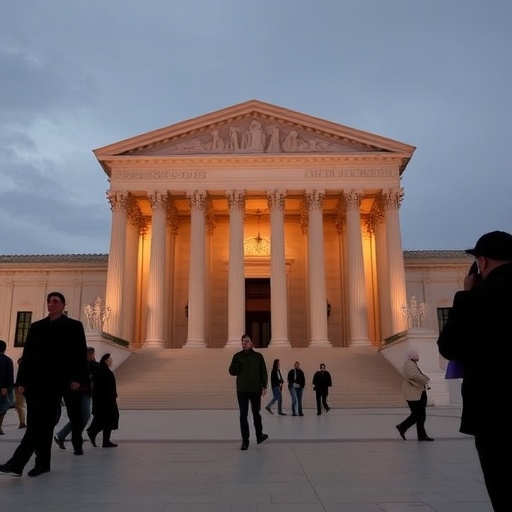Supreme Court Grapples with Voter ID Laws in High-Stakes Voting Rights Showdown
In a decision that could reshape elections nationwide, the U.S. Supreme Court today delved into a landmark case challenging stringent voter ID laws, potentially deciding the future of access to the ballot box for millions of Americans. As arguments unfolded in the marbled halls of the nation’s highest court, justices grilled attorneys on both sides, highlighting deep divisions over balancing election security with fundamental voting rights.
- Origins of the Dispute: Georgia’s Voter ID Mandate Under Fire
- Broader Implications: How Voter ID Laws Reshape State Elections
- Justices’ Scrutiny: Key Exchanges That Could Tip the Scales
- Stakeholders Mobilize: Civil Rights Advocates Versus Election Integrity Groups
- Looking Ahead: Possible Rulings and Their Nationwide Echoes
The case, Smith v. Georgia Election Board, stems from a lower court ruling that struck down Georgia’s voter ID requirements as overly burdensome, particularly for low-income and minority voters. With midterm elections looming, the outcome here could set precedents for similar laws in over 30 states, amplifying the stakes in an era of polarized politics.
Origins of the Dispute: Georgia’s Voter ID Mandate Under Fire
The controversy ignited in 2022 when Georgia enacted House Bill 531, mandating photo identification for absentee ballots and imposing strict verification processes at polling stations. Proponents, including state Republicans, argued the law was essential to prevent fraud, citing isolated incidents like the 2020 election where unfounded claims of irregularities fueled national debates. “Voter ID laws are common-sense safeguards,” said Georgia Attorney General Chris Carr in a pre-hearing statement. “They ensure every vote counts without dilution.”
Opponents, led by civil rights organizations such as the NAACP and the ACLU, filed suit almost immediately, claiming the law disproportionately disenfranchises marginalized communities. Statistics from the Brennan Center for Justice reveal that 11% of U.S. citizens—over 21 million people—lack ready access to government-issued photo ID, with higher rates among Black (25%), Latino (16%), and low-income voters (15%). In Georgia, where African Americans make up 32% of the population but only 29% of registered voters, critics argue the law echoes Jim Crow-era tactics designed to suppress turnout.
During oral arguments, lead plaintiff attorney Elena Ramirez emphasized the human cost: “Imagine a single mother working two jobs, unable to take time off to obtain an ID that expires every four years. This isn’t security—it’s a barrier to democracy.” The Supreme Court, in its 6-3 conservative majority configuration, appeared split, with Justice Sonia Sotomayor pressing on disparate impacts while Justice Clarence Thomas remained notably silent, as is his custom.
Broader Implications: How Voter ID Laws Reshape State Elections
Georgia’s law is no outlier; voter ID requirements vary widely across the U.S., creating a patchwork of access that confounds voters and election officials alike. As of 2023, 36 states enforce some form of ID mandate, up from just 10 in 2000, according to the National Conference of State Legislatures. Strict photo ID laws, like Georgia’s, exist in 18 states, often justified post-2013 when the Supreme Court’s Shelby County v. Holder decision gutted key provisions of the Voting Rights Act, freeing states from federal preclearance for changes affecting minority voters.
This shift has led to a surge in litigation. In Texas, a 2021 law requiring IDs for mail-in voting faced challenges from the League of Women Voters, who presented data showing a 2-5% drop in turnout among seniors and students. Similarly, Wisconsin’s 2011 law was partially upheld but modified after evidence showed it prevented 300,000 eligible voters from casting ballots in 2016. “These laws don’t stop fraud—they stop participation,” noted election law expert Rick Hasen in a recent op-ed for The New York Times.
Proponents counter with security metrics. The Heritage Foundation’s database logs over 1,500 proven voter fraud cases since 1982, though experts like those at the Brennan Center deem widespread fraud a myth, occurring in less than 0.0001% of votes. Yet, in the Supreme Court chamber, Solicitor General Elizabeth Prelogar defended federal interests by warning that inconsistent state laws erode public trust, potentially leading to more challenges like the 2020 post-election lawsuits.
To illustrate the real-world effects, consider North Carolina’s 2013 law, struck down for targeting Black voters “with almost surgical precision,” per a federal judge. Post-ruling, turnout among African Americans rose by 4% in subsequent elections, per MIT election data. If the Supreme Court upholds Georgia’s law, analysts predict ripple effects: states like Florida and Arizona could tighten their rules, while others like California might bolster get-out-the-vote efforts to counter suppression.
Justices’ Scrutiny: Key Exchanges That Could Tip the Scales
Oral arguments revealed a court wrestling with constitutional tensions between the 14th Amendment’s equal protection clause and states’ rights to regulate elections. Chief Justice John Roberts opened with questions on administrative burdens, asking Georgia’s counsel, “How do you justify a system where obtaining an ID requires fees and travel that many can’t afford?” The response invoked free ID programs, but Justice Elena Kagan interjected, citing a Government Accountability Office report that only 60% of eligible Georgians successfully navigate these processes on first try.
Conservative justices, including Neil Gorsuch and Amy Coney Barrett, probed fraud prevention, with Gorsuch referencing a 2016 study by the Cato Institute estimating minimal but existent non-citizen voting. “Even one fraudulent vote undermines the system,” he stated. Liberal justices pushed back; Justice Ketanji Brown Jackson highlighted intersectional harms, quoting from amicus briefs by AARP and disability rights groups that voter ID laws exacerbate barriers for the elderly and disabled, who comprise 20% of non-ID holders.
Notable was Justice Brett Kavanaugh’s line of questioning on proportionality: “If fraud is rare, why impose broad restrictions?” This suggests potential for a middle-ground ruling, perhaps narrowing the law rather than striking it entirely. Historical precedents loomed large—Crawford v. Marion County Election Board (2008) upheld Indiana’s ID law but left room for challenges based on undue burden. Today’s session echoed that, with attorneys citing evolving data on turnout suppression.
Observers noted the absence of direct abortion analogies, but parallels to Dobbs v. Jackson surfaced in discussions of federalism. “This court has empowered states before; now we’re seeing the fallout in voting rights,” remarked Harvard Law professor Noah Feldman in post-argument analysis.
Stakeholders Mobilize: Civil Rights Advocates Versus Election Integrity Groups
Beyond the bench, the case has galvanized a coalition of voices. The Southern Poverty Law Center rallied over 50,000 signatures in support of plaintiffs, emphasizing Voting Rights Act remnants like Section 2, which prohibits discriminatory practices. “Voter ID laws are the new poll tax,” declared NAACP President Derrick Johnson at a Washington rally. Their brief included testimonials from voters turned away in 2022 primaries, including a 78-year-old veteran whose expired military ID was rejected.
On the other side, groups like True the Vote and the Public Interest Legal Foundation filed supporting briefs, pointing to a 2022 Georgia audit uncovering 1,634 potential double votes—though subsequent investigations found no intent. “Integrity starts with verification,” argued J. Christian Adams, PLF president, in a Fox News interview. State officials from red states like Alabama and Missouri submitted amicus curiae urging uniformity to deter “ballot harvesting” schemes.
Business leaders weighed in too; the U.S. Chamber of Commerce expressed concerns over voter disenfranchisement’s impact on workforce participation, while tech firms like Google advocated for digital ID solutions to modernize processes. Polling from Pew Research shows 80% of Americans support some ID requirement, but support drops to 55% when informed of access barriers, underscoring the need for balanced reforms.
International eyes are on the case as well; the OSCE’s election monitors have critiqued U.S. ID laws for conflicting with democratic standards, potentially affecting America’s global standing on human rights.
Looking Ahead: Possible Rulings and Their Nationwide Echoes
A decision is expected by late June 2024, just before the presidential election cycle intensifies. If the Court strikes down or limits Georgia’s law, it could invalidate similar provisions in states like Texas and Louisiana, prompting a wave of federal lawsuits and state-level adjustments. Conversely, an upholding could embolden conservative legislatures to expand ID mandates, including biometric options piloted in Louisiana.
Experts forecast a 5-4 split, with swing votes from Roberts and Kavanaugh pivotal. “This ruling will define voting rights for a generation,” predicted the Campaign Legal Center’s executive director, Trevor Potter. In preparation, nonprofits are scaling up ID assistance programs; Georgia’s DMV reported a 30% uptick in applications post-arguments.
Long-term, the case underscores the fragility of democratic access amid rising partisanship. With 2024 elections projected to see record turnout—over 160 million voters, per election models—any chill on participation could sway close races. Lawmakers on both sides signal readiness for congressional action; Democrats push for a new Voting Rights Act restoration, while Republicans eye national ID standards. As the nation watches, this Supreme Court battle reaffirms voting rights as the bedrock of American democracy, demanding vigilance to protect it for all.








